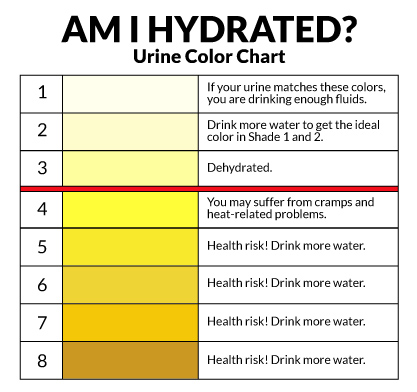Amy Stephens
MS, RDN, CSSD, CEDS
Licensed dietitian
specializing in sports nutrition
and eating disorders
MS, RDN, CSSD, CEDS
Licensed dietitian
specializing in sports nutrition
and eating disorders
Water is the forgotten nutrient
Exercise produces heat and leaves the body as sweat to stay cool. Studies have repeatedly shown that losing more than 2% body weight impacts performance (James). More sweat is produced when the temperatures are higher or when humidity is high. Dehydration results in an increase in one’s core temperature, reduced cardiovascular function and imparied exercise performance.
Essentially, dehydration increases an athlete’s perceived effort and reduces the ability to continue exercising at a high level (Nybo). If you’re overheating, the body will prioritize cooling itself versus rapid energy production (James).
Role of sweat
During exercise, the body produces heat and energy. Sweat is the body’s built-in cooling system that enables the body to make more energy. In warmer temperatures, exercise raises core temperatures at a faster rate which require more water expelled through the skin to keep the body cool. As temperatures increase, our bodies respond by sweating more. However, humidity compounds this problem by preventing evaporation. In situations where humidity levels are high, as we experience on the east coast all summer long, there is more moisture in the air and the sweat does not evaporate. As a result, the body’s core temperature increases, making exercise seem harder.

Dehydration affects performance
Many studies have shown that a 2% loss in body weight will impair performance (Lewis). The body has to work harder to keep the heart pumping to produce energy and muscles firing. Not only does it feel harder when you are dehydrated, but your body is also producing energy at a slower rate.
As core temperatures increase, energy metabolism shifts from aerobic production to anaerobic and this causes a buildup of anaerobic by-products that stimulate fatigue. This process occurs at a faster rate in hot and humid conditions. Fuel source shifts from fatty acids to glucose and amino acids and creates more hydrogen and lactic acid (Burke 2015). The heart receives less blood and therefore, less oxygen is delivered to working muscles. This makes exercising even more difficult in warmer conditions. Muscles have a harder time contracting when they’re overheated and premature fatigue can set in (Nybo).
Cramping
If you lose too much water, the risk of cramping is increased. Humidity increases risk of dehydration which causes an imbalance of electrolytes, especially potassium, magnesium and sodium. These electrolytes are lost at high levels through the skin and have a significant impact on cramping (Jung).
Symptoms of dehydration
Dietary recommendations in the heat
Fluid requirements are individualized. Establish your sweat rate by using a sweat test to better estimate the amount of sweat you lose in one hour of exercise. Once you know how much fluid your body loses, you can more precisely match your fluid requirements. Estimate fluid losses by using a sweat rate calculator to input your weight and fluids. Calories do not need to be increased when exercising in heat (Burke).
Hyponatremia is caused by drinking too much water and not enough electrolytes. Make sure to have salt or nuun tablets handy. Water follows electrolytes and when you sweat, you lose both!
The color of your urine is the best indicator of hydration. Aim for pale yellow, shade 1 or 2 on the chart is ideal. Clear urine can indicate fluid overload and hyponatremia. If your urine is dark yellow before a run, delay the start until you can drink more fluids.

References
Baker & Jeukendrup. Optimal composition of fluid replacement beverages. Comp Physiol. 2014;4:575-620.
Burke L. Nutritional needs for exercise in the heat. Comp Biochem Physiol Mol Integr Physiol. 2001; 128: 735-48.
Burke L. Clinical Sports Nutrition, 5th edition. 2015.
Cory M, et al. Resistance training in the heat improves strength in professional rugby athletes. Sci Med in Football. 2019;3:198–204.
James LJ, et al. Does Hypohydration Really Impair Endurance Performance? Methodological Considerations for Interpreting Hydration Research. Sports Med. 2019 Dec;49(Suppl 2):103-114.
Jung A, et al. Influence of Hydration and Electrolyte Supplementation on Incidence and Time to Onset of Exercise-Associated Muscle Cramps. J Athl Train. 2005; 40: 71–75.
Lewis J, et al. Does Hypohydration Really Impair Endurance Performance? Methodological Considerations for Interpreting Hydration Research. Sports Med. 2019;49:103-114.
Nybo & Sawka. Performance in the heat physiological factors of importance for hyperthermia-induced fatigue. Compr Physiol 2014;4:657-89.
Lau W, et al. Effect of oral rehydration solution versus spring water intake during exercise in the heat on muscle cramp susceptibility of young men. J of the Intl Soc of Sp Nutr. 2021; 18 (1).